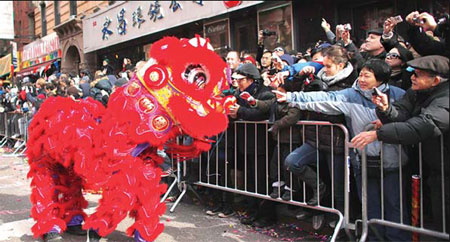More new emigrants find success
Updated: 2012-12-18 07:56
By Li Yao (China Daily)
|
||||||||
|
People attended a Chinese New Year parade in Chinatown in New York on Jan 29. The Lunar New Year began on Jan 23 and marked the start of the Year of the Dragon, according to the Chinese zodiac. Eduardo Munoz / Reuters |
New Chinese emigrants are moving up the social ladder as more of them have a better education and sophisticated jobs, especially in the United States.
According to the 2012 Blue Book of Overseas Chinese, released on Monday, about 1 million Chinese emigrated to the US during the past decade.
The number of new US residents of Chinese origin exceeded 4 million in 2010, a jump of 65.5 percent over a decade ago.
"New Chinese emigrants to the United States are more concentrated in the higher education and technology sectors," said Huang Ping, a scholar of US studies at the Chinese Academy of Social Sciences.
Chinese-Americans are the fifth-largest demographic group in the US, after Caucasians, African-Americans, Mexican-Americans and Puerto Rican Americans.
The demographic percentage and influence of Chinese-Americans in the US will continue to rise in the coming years, Qiu Jin, chief editor of the blue book, said at a news conference in Beijing.
The percentage of Chinese-Americans holding a master's or a bachelor's degree is twice the figure of the US average, according to the book.
More Chinese-Americans work in trade, finance, healthcare, education and social sciences, while 10 years ago their counterparts were usually found in manufacturing, sales and services jobs.
Chinese-Americans have tended to live in metropolises such as New York, San Francisco and Chicago.
Their communities have expanded to suburban areas, where they find nicer living conditions, better schools and safer neighborhoods.
Experts warn that the trend of increasing emigration of talented Chinese people to other countries may leave China with a brain drain.
But favorable policies and numerous projects have been introduced to attract returnees, who bring back management knowledge, innovative ideas and strong cultural ties to China, said Qiu.
Elsewhere in the world, people of Chinese origin are more comfortable with their new identities, the blue book said.
In Southeast Asia, the earliest emigrants considered themselves as people from Fujian, Guangdong or Hainan provinces. But later emigrants called themselves Thai Chinese, Indonesian Chinese or Malay Chinese.
Nowadays, many simply call themselves Thai, Indonesian or Malay, despite their Chinese roots, the book said.
liyao@chinadaily.com.cn
(China Daily 12/18/2012 page3)

 Relief reaches isolated village
Relief reaches isolated village
 Rainfall poses new threats to quake-hit region
Rainfall poses new threats to quake-hit region
 Funerals begin for Boston bombing victims
Funerals begin for Boston bombing victims
 Quake takeaway from China's Air Force
Quake takeaway from China's Air Force
 Obama celebrates young inventors at science fair
Obama celebrates young inventors at science fair
 Earth Day marked around the world
Earth Day marked around the world
 Volunteer team helping students find sense of normalcy
Volunteer team helping students find sense of normalcy
 Ethnic groups quick to join rescue efforts
Ethnic groups quick to join rescue efforts
Most Viewed
Editor's Picks

|

|

|

|

|

|
Today's Top News
Health new priority for quake zone
Xi meets US top military officer
Japan's boats driven out of Diaoyu
China mulls online shopping legislation
Bird flu death toll rises to 22
Putin appoints new ambassador to China
Japanese ships blocked from Diaoyu Islands
Inspired by Guan, more Chinese pick up golf
US Weekly

|

|







